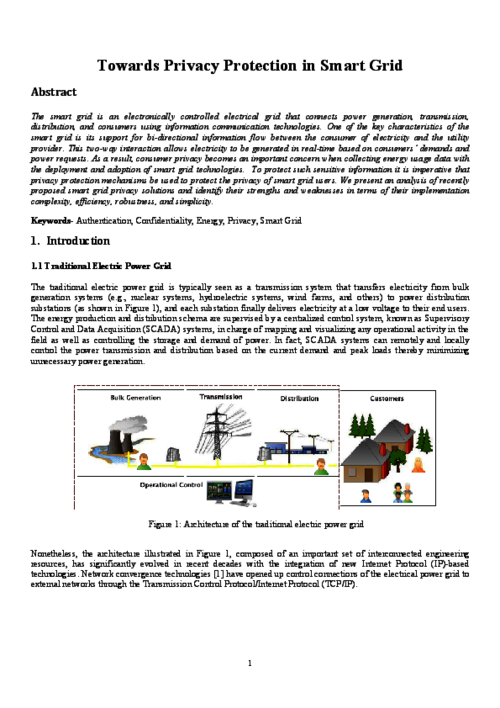 ] Title Type Year
] Title Type Year |
"Information Security, 8th International Conference, ISC 2005, Singapore, September 20-23, 2005, Proceedings", ISC, vol. 3650, Springer, 2005. 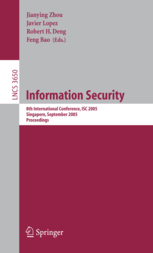 |  |
21st International Information Security Conference (IFIP SEC’06), no. 201, Springer, pp. 221-232, May, 2006.
Abstract
Contract signing is a fundamental service in doing business. The Internet has facilitated the electronic commerce, and it is necessary to find appropriate mechanisms for contract signing in the digital world. A number of two-party contract signing protocols have been proposed with various features. Nevertheless, in some applications, a contract may need to be signed by multiple parties. Less research has been done on multi-party contract signing. In this paper, we propose a new synchronous multi-party contract signing protocol that, with n parties, it reaches a lower bound of 3(n − 1) steps in the all-honest case and 4n − 2 steps in the worst case (i.e., all parties contact the trusted third party). This is so far the most efficient synchronous multi-party contract signing protocol in terms of the number of messages required. We further consider the additional features like timeliness and abuse-freeness in the improved version.
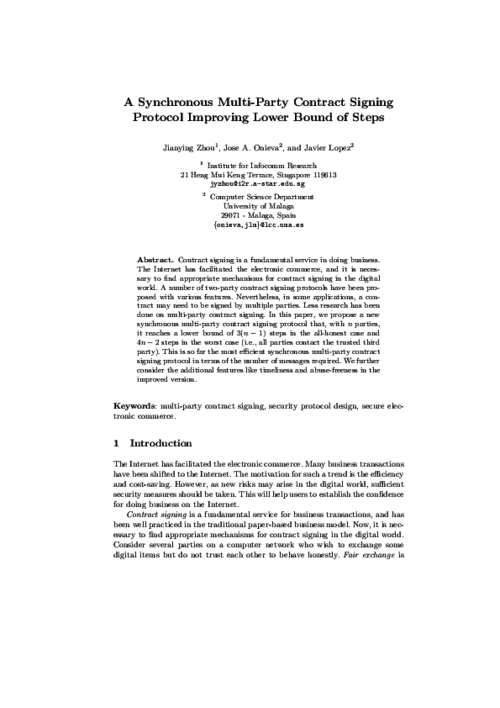
60th IEEE Vehicular Technology Conference (VTC’04), IEEE Vehicular Technology Society Press, pp. 3271-3274, 2004.
Abstract
Mobile agents are especially useful in electronic commerce, for both wired and wireless environments. Nevertheless, there are still many security issues on mobile agents to be addressed, for example, data confidentiality, non-repudiability, forward privacy, publicly verifiable forward integrity, insertion defense, truncation defense, etc. One of the hardest security problems for free roaming agents is truncation defense where two visited hosts (or one revisited host) can collude to discard the partial results collected between their respective visits. We present a new scheme satisfying those security requirements, especially protecting free roaming agents against result-truncation attack.
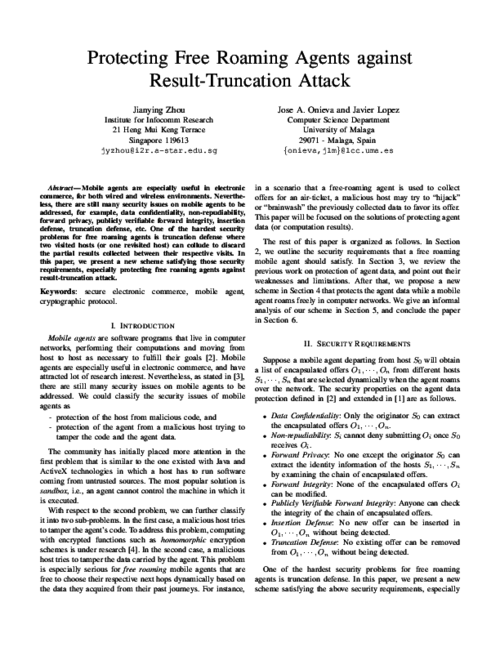
Information Security Technical Report, vol. 12, no. 3, Elsevier, pp. 179-185, 2007. DOI
Abstract
Spam is a big problem for email users. The battle between spamming and anti-spamming technologies has been going on for many years. Though many advanced anti-spamming technologies are progressing significantly, spam is still able to bombard many email users. The problem worsens when some anti-spamming methods unintentionally filtered legitimate emails instead! In this paper, we first review existing anti-spam technologies, then propose a layered defense framework using a combination of anti-spamming methods. Under this framework, the server-level defense is targeted for common spam while the client-level defense further filters specific spam for individual users. This layered structure improves on filtering accuracy and yet reduces the number of false positives. A sub-system using our pre-challenge method is implemented as an add-on in Microsoft Outlook 2002. In addition, we extend our client-based pre-challenge method to a domain-based solution thus further reducing the individual email users’ overheads.
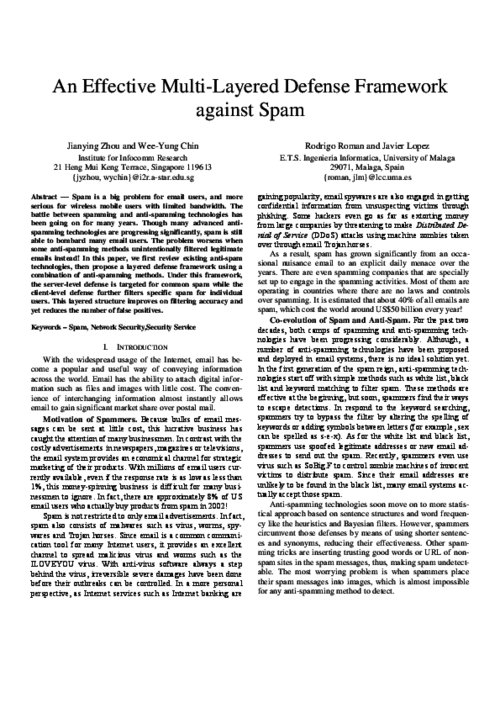
6th Conference on E-Commerce (CEC’04), IEEE Computer Society, pp. 221-226, June, 2004.
Abstract
Mobile agents play an important role in electronic commerce. Security in free-roaming agents is especially hard to achieve when the mobile code is executed in hosts that may behave maliciously. Some schemes have been proposed to protect agent data (or computation results). However, a known vulnerability of these techniques is the truncation attack where two visited hosts (or one revisited host) can collude to discard the partial results collected between their respective visits. Cheng and Wei proposed a scheme in ICICS’02 to defense against the truncation of computation results of free-roaming agents. Cheng-Wei scheme is effective against such an attack in most cases. However, we demonstrate that it still suffers from the truncation attack when a special loop is established on the path of a free-roaming agent. We further propose two amendments to Cheng-Wei scheme to avoid such an attack.
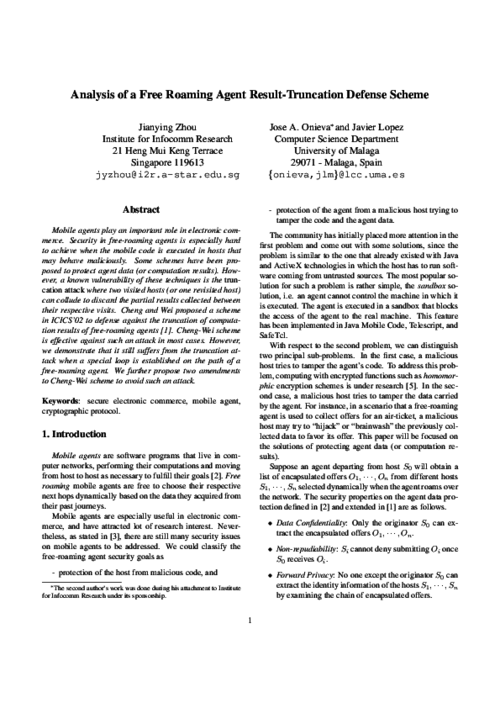
23rd International Information Security Conference (SEC 2008), vol. 278, pp. 125-139, 2008.
Information Management & Computer Security Journal, vol. 13, no. 5, pp. 350-366, 2005.
Abstract
As a value-added service to deliver important data over the Internet with guaranteed receipt for each successful delivery, certified email has been discussed for years and a number of research papers appeared in the literature. But most of them deal with the two-party scenarios, i.e., there are only one sender and one recipient. In some applications, however, the same certified message may need to be sent to a set of recipients. In this paper, we presents two optimized multi-party certified email protocols. They have three major features. (1) A sender could notify multiple recipients of the same information while only those recipients who acknowledged are able to get the information. (2) Both the sender and the recipients can end a protocol run at any time without breach of fairness. (3) The exchange protocols are optimized, each of which have only three steps.
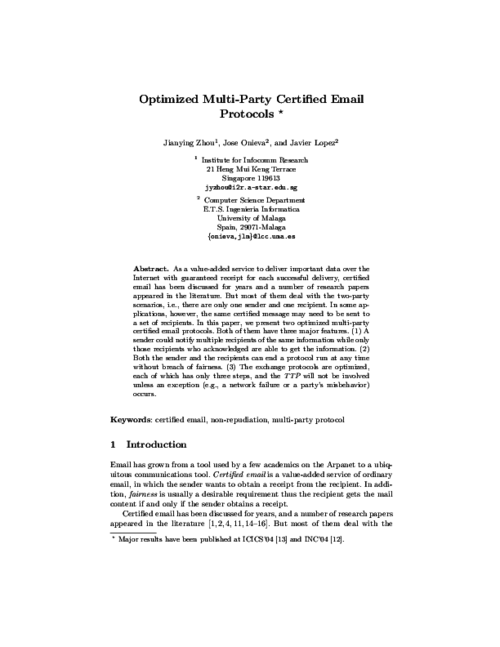
Wireless Personal Communications, vol. 73, Springer, pp. 23-50, Nov 2013, 2012. DOI
Abstract
The smart grid is an electronically controlled electrical grid that connects power generation, transmission, distribution, and consumers using information communication technologies. One of the key characteristics of the smart grid is its support for bi-directional information flow between the consumer of electricity and the utility provider. This two-way interaction allows electricity to be generated in real-time based on consumers’ demands and power requests. As a result, consumer privacy becomes an important concern when collecting energy usage data with the deployment and adoption of smart grid technologies. To protect such sensitive information it is imperative that privacy protection mechanisms be used to protect the privacy of smart grid users. We present an analysis of recently proposed smart grid privacy solutions and identify their strengths and weaknesses in terms of their implementation complexity, efficiency, robustness, and simplicity.
